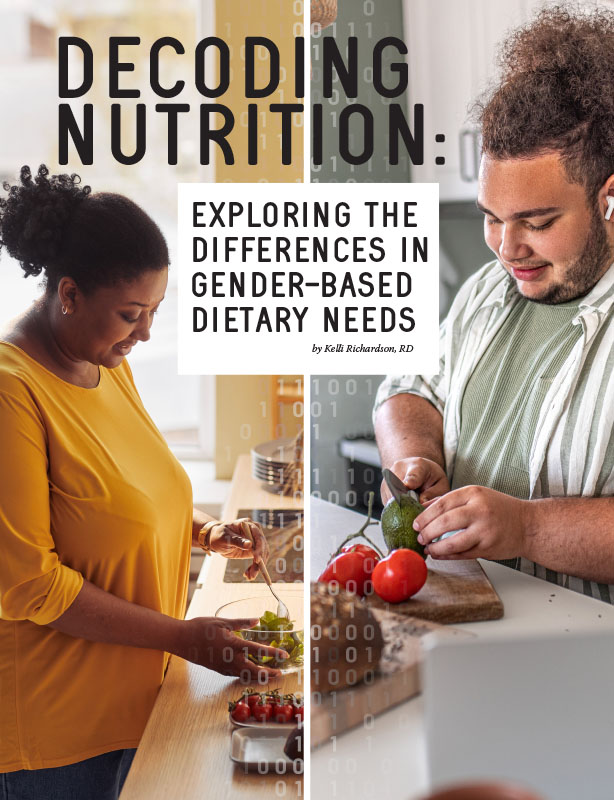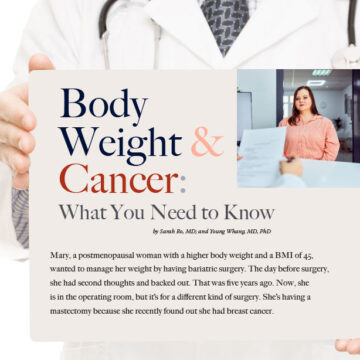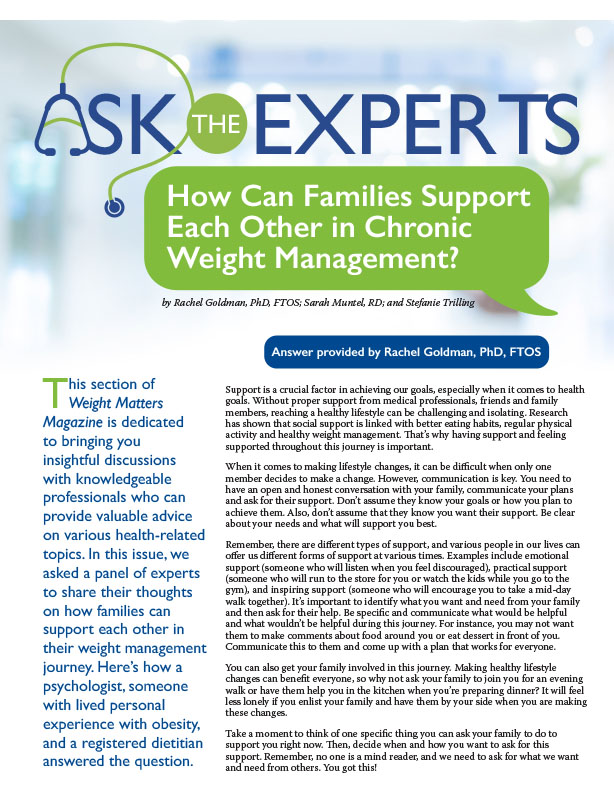Decoding Nutrition: Exploring the Differences in Gender-Based Dietary Needs


by Kelli Richardson, RD
You’ve probably heard the generic advice before: Eat your fruits and veggies. Limit how many sugary beverages you drink. Your neighbor has probably heard this too — regardless of how you both identify with gender. However, should men and women be prioritizing different nutrients? Here’s a look at how biological differences can impact nutrition needs.
Calories and Macronutrients
Let’s start with the basics: How much energy you need to fuel your body’s activity. Age, physical activity, height, weight, and whether or not you are pregnant or breastfeeding all play a role in how many calories you need. But on average, men need more calories than women. For example, on average, a 35-year-old sedentary male needs 2,400 calories, while a female only needs 1,800 calories. Why? Men typically have more muscle mass, which requires more energy to sustain.
Despite the differences in how much you need — what you need is the same. Macronutrients (carbohydrates, fat and protein) are the nutrients your body needs in large amounts. The 2020-2025 Dietary Guidelines for Americans recommend both men and women consume 45–65% of their calories from carbohydrates, 20–35% from fats, and 10–35% from protein.
Vitamins and Minerals
In addition to macronutrients, our bodies also need micronutrients (vitamins and minerals) in smaller amounts. Despite their name, micronutrients play a key role in our health. Each vitamin and mineral has a specific job, such as helping with our vision, immune system, metabolism and more!
Men and women have the same recommendations for many of these nutrients, including sodium, vitamin D and vitamin E. But when it comes to vitamins and minerals like iron, calcium and zinc, their needs differ. Here’s why:
- Iron: Women need significantly more iron – at least 10 mg extra – to offset what is lost during menstrual periods, which can leave them at a higher risk for iron deficiency. During pregnancy, women need even more iron (an extra 9 mg per day) to support the baby’s growth. You can find iron in lean meats, leafy greens like spinach, and many breakfast cereals.
- Calcium: Once women reach the age of 50, they also require more calcium (1,200 mg total) to help prevent bone loss or osteoporosis. Osteoporosis is four times more common in women because they start losing bone mass at an earlier age and at a faster speed, which may also be accelerated during menopause. Sources of calcium include milk, yogurt, sardines and salmon.
- Zinc: Zinc is an important nutrient for men because it supports fertility. Overall, men require 11 mg of zinc daily, whereas non-pregnant women only require 8 mg. Zinc can be found in nuts, meat, fish and dairy.
Women who are pregnant require even more of certain nutrients, including:
- Folate: Folate is important during the early stages of pregnancy to support the development of a healthy brain and spine. While most prenatal supplements contain folate, it can also be found naturally in dark-green vegetables, beans and fortified cereals.
- Iodine: More iodine is needed during pregnancy and breastfeeding to support the baby’s brain development. Women are encouraged to choose iodized salt and eat other foods containing iodine, including dairy and eggs.
- Choline: Choline is also important during pregnancy and breastfeeding to support the development of the baby’s brain and spine. Many dairy and protein sources, such as milk, eggs and meat, contain choline.
Nutrition Guidelines for Transgender People
While research in this area is still needed, gender-affirming therapies can have an impact on energy needs, as well as needs for certain nutrients like calcium and iron.
- Female-to-male: Those taking testosterone may experience increased muscle mass, more weight in the waist, and a loss of menstrual periods. These body changes typically begin 6-12 months after starting hormone therapy and can take up to 2-5 years. More calories may be needed due to increased muscle mass, and less iron may be required due to a lack of menstrual periods.
- Male-to-female: Those taking estrogen may experience reduced muscle mass and more weight in the hips and thighs. This typically begins 3-6 months after taking hormone therapy and can take up to 1-2 years. Fewer calories may be needed due to a loss of muscle mass.
These changes, and the speed at which they occur, can affect the amount of nutrients you need. Additionally, hormone therapies can have a negative effect on heart health, which means getting adequate nutrition is even more important. Consult with your healthcare provider or a registered dietitian nutritionist to determine your personal nutrition goals based on your transition progress. Those who are taking hormone therapy and are not fully transitioned may be given a range in which their nutrition needs fall.
How Biological Sex Impacts Weight
Although men typically use more calories than women, they still experience higher rates of overweight and obesity. Today, 34.1% of men in the U.S. are overweight, compared to only 27.5% of women. Where this weight is stored is also different between men and women. Men are typically “apple-shaped,” meaning they store fat around the waist, while women are typically “pear-shaped,” meaning they store fat around the hips. The “apple-shaped” body type also contributes to the higher rates of heart disease at a younger age seen in men compared to women. Limiting the amount of saturated fat and sodium you consume is recommended to help prevent heart disease.
The Bottom Line
While there are some differences in nutrition needs between men and women, if you’re trying to lose weight or just eat healthier, the advice is the same: Focus on a well-balanced diet that includes fruits, vegetables and whole grains, and one that limits saturated fat, added sugar and sodium. If you have concerns about your nutrition, consult with your healthcare provider or registered dietitian.
About the Author:
Kelli Richardson, RDN, is a fourth-year PhD candidate in the School of Nutritional Sciences and Wellness at the University of Arizona. She is a Registered Dietitian Nutrition and was acknowledged by the Arizona Academy of Nutrition and Dietetics as the Recognized Young Dietitian of the Year in 2022. She currently serves on the board of the Southern Arizona Academy of Nutrition and Dietetics and was the Global Science Nutrition Intern at WeightWatchers®.
by Rachel Goldman, PhD, FTOS; Sarah Muntel, RD; and Stefanie Trilling Winter 2024 This section of Weight…
Read Articleby Nina Crowley, PhD, RD (with Inspiration from Shawn Cochran) Winter 2024 Dating, no matter your age,…
Read Articleby Leslie M. Golden, MD, MPH, ABOM Diplomate Winter 2024 The journey to overcoming obesity is a…
Read Article








